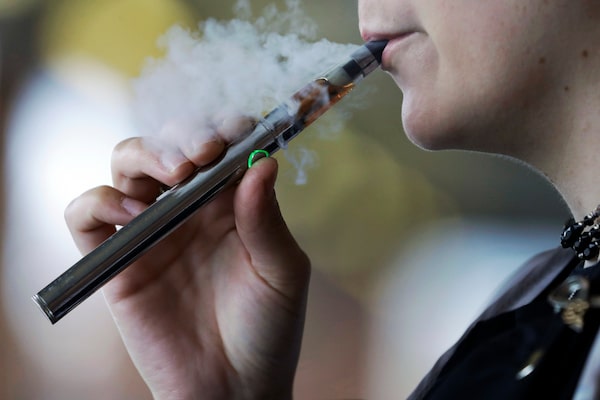
In a survey, more than half of young e-cigarette users cited flavouring as the top reason they tried vaping.Tony Dejak/The Associated Press
In the push to curb the number of young people who vape, flavoured e-cigarettes have become a prime target for health experts who say candy, dessert and fruit tastes are luring young people into a dangerous habit. Now, Nova Scotia is fighting back, becoming the first jurisdiction in Canada to adopt a ban on flavoured vaping products, effective April 1.
The province said Thursday it will still allow the sale of vaping products that are either tobacco flavoured or without flavour.
“We’ve worked hard to shift to a smoke-free culture and we do not want to lose ground. Vaping rates, especially among young people, have been growing and we’re concerned with what we’re seeing,” Health and Wellness Minister Randy Delorey said in a statement.
The Nova Scotia announcement is the latest in a string of moves by the provinces in recent weeks aimed at further restricting vaping sales to youth. Ontario, British Columbia, Prince Edward Island and Quebec have all announced new policies designed to restrict youth access to vaping. For instance, B.C. has said it will prohibit the sale of e-cigarette flavours that could appeal to minors and will only allow flavoured vaping products to be sold in specialty shops, starting next year. And Ontario said Thursday it’s considering reducing the number of flavours to a few.
The result is a patchwork of provincial rules that highlight the need for a federal law to create a level playing field across the country, experts say.
“There should not be variations across the country in the degree to which Canadians … are protected from e-cigarettes,” said Matthew Stanbrook, a respirologist at Toronto Western Hospital. “It’s the job of the federal government to make sure it’s uniform across the country.”
The federal government this year proposed new advertising restrictions for vaping products, such as prohibiting any product promotions in public places where youth have access, including transit. Health Canada also conducted a public consultation on the possibility of flavour restrictions.
Andrew Pipe, chair of the Heart and Stroke Foundation and professor of medicine at the University of Ottawa, said provinces are responding to a “policy vacuum.”
“It would be better if we did have a national set of standards and regulations, but in the absence of that, the provinces are quite rightly going to move forward,” Dr. Pipe said.
Eric Gagnon, head of corporate and regulatory affairs for Imperial Tobacco Canada, said the move to ban flavours is unlikely to affect youth vaping levels. Instead, such policies are likely to drive people to the black market and deter existing adult smokers from trying to quit using e-cigarettes, he said.
Daniel David, president of the Vaping Industry Trade Association, said he believes Nova Scotia’s flavour ban is more about politics than public health. “There’s nothing right now from the federal government. We have this push from the provinces to almost outdo each other” with new vaping restrictions.
He added VITA, which represents vape brands including Juul and Vype, is hopeful Ottawa will take a different approach, taking into account e-cigarettes’ use as a harm-reduction tool.
Vaping-related illnesses have been in the spotlight recently amid accusations the makers of the products are targeting them at youth. Dr. James MacKillop outlines some strategies to use at home in conversations with your children about vaping. MacKillop is the director of the Peter Boris Centre For Addictions Research and co-director of the Michael G. Degroote Centre For Medicinal Cannabis Research.
The Globe and Mail (staff)
Nova Scotia’s flavour ban could serve as a catalyst for other governments to follow suit, according to tobacco control experts. Rob Cunningham, senior policy analyst with the Canadian Cancer Society, pointed out that Nova Scotia was the first province to ban the menthol flavour from tobacco products – a policy that has since been adopted nationwide.
“If Nova Scotia can do it, it signals what can be done,” Mr. Cunningham said.
New PEI legislation will set the legal age to purchase e-cigarettes or tobacco to 21, which is the highest in the country, and will only allow vaping products to be sold in specialty shops, not convenience stores or gas stations.
Ontario will ban vaping ads from convenience stores and gas stations as of Jan. 1. On Thursday, Health Minister Christine Elliott said the government is considering possible flavour restrictions and other measures, such as nicotine content.
Ms. Elliott said one possibility would be to “limit the flavours that are available to menthol and one or two others."
Our Morning Update and Evening Update newsletters are written by Globe editors, giving you a concise summary of the day’s most important headlines. Sign up today.
 Carly Weeks
Carly Weeks